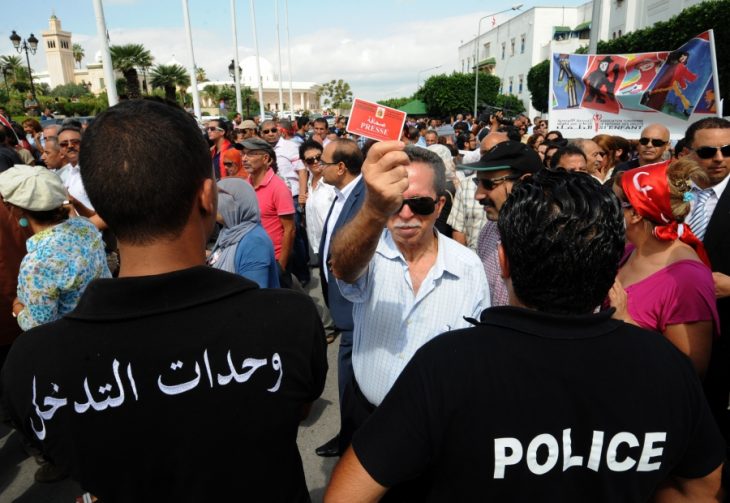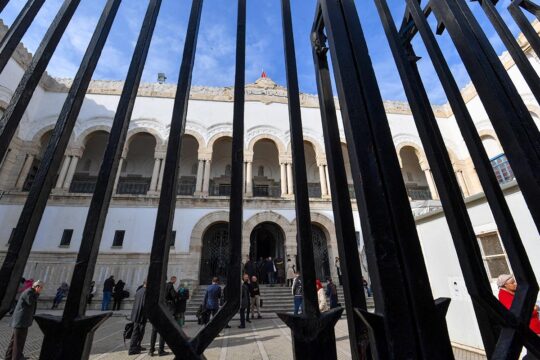Olfa Belhassine is a journalist for newspaper La Presse in Tunisia and correspondent for JusticeInfo in that country. To mark World Press Freedom Day this May 3, we publish her account of Tunisia’s transition from zero press freedom to a state where it is still fragile.
Amazing! The revolution broke out almost beneath the windows of this 70-year-old newspaper in central Tunis on that Friday January 14, 2011. The walls of La Presse, which Ben Ali’s propaganda had rendered lifeless and self-censoring especially in the last years of his rule (1987-2011), shook to the sounds of people calling for new freedoms. “Get out! Interior Ministry, Ministry of Terror!” shouted the crowd. “Free Tunisia, Ben Ali get out!”, “Freedom for Tunisia, freedom!”, “No more Presidents for life!”.
La Presse had for years been controlled by the government, which meant dedicating much space to praising the dictator Ben Ali and his wife with her many mafia brothers. That day it did not know what to do, and what editorial line to take, even less to what authority it should refer.
“As early as the 1960s, information became a government tool to serve its interests, ensure `national unity` and `development`,” writes political scientist Larbi Chouikha*, who teaches at the Tunis Press Institute.
So La Presse, founded by Henri Smadja in 1934 and confiscated by the State in 1968, found itself left to its own devices. It was completely at a loss! All the more so because Ben Ali, in the last speech of a failing dictator, announced a dissolution of the Stalinian Ministry of Communication and “full freedom of the press, free access to the Internet…”
Unheard of!
In the editorial room of La Presse, the “revolutionary” demands and petitions of some journalists met disdainful scepticism from “the others”. Ben Ali had not yet fled the country (he would do so at 17.45 the same day) and hopes of deals with the authorities were still possible. But “Hell is other people” -- those who, conditioned to obey and adept at fawning to authority, would take back their temporarily lost power a few years after the tsunami of December 17, 2010 to January 14, 2011. Failure to reveal the truth about the many networks of the machine of terror that had muzzled the press for half a century made possible the return five years later of former Ben Ali propagandists. They returned to head various media, as if nothing had happened, unashamed of their small-mindedness, their nostalgia for the old regime and their links with political and business circles. Adapting to anything, including the new liberal vocabulary, is second nature to them. In the half-light between two worlds that is a transition, monsters raise their heads…
Not everyone likes the new-found freedom of expression. The sudden lifting of restrictions fills some with doubt and fear. The erasing of clear lines established by the dictatorship means making new choices, trying out new horizons of autonomy and investing in them. It means new ground, teeming with life, to test, explore and transmit, professionalism to be applied.
In fact, all the years of tight media policing and deliberately weak journalism training left the sector in bad shape.
In journalists’ debates, some surprising questions kept coming up:
- “Just how far can we now go?”
- “What are the limits on freedom of expression?”
- “What should be our new identity?”
New pockets of tension
At the same time, new pockets of tension had opened in Tunisia’s tumultuous democratic transition. The new political elite that won the October 23, 2011 elections -- Ennahda (Islamist), the Congress for the Républic (CPR) and Ettakatol -- chose to class journalists among their enemies.
“Media of shame!” shouted the Leagues for the Protection of the Revolution, militia close to the Islamists, at all those who criticized or conducted uncomfortable investigations into the actions of the Ennahdha-led government.
As opinion influencers, with the writing tools of “truth”, journalists were once again the focus of political hysteria, at the heart of struggles for power. “In Ben Ali’s time, journalists only opened their mouths for the dentist!” said Human Rights and Transitional Justice Minister Samir Dilou in February 2012.
Rather than reflecting the lost honour and past compromises of some Tunisian journalists, we should perhaps rather take the expression “media of shame” as a mistake, to such an extent did it reflect the frustrations and hidden desires of a Troika in search of tools to spread its praise. Other politicians from secular parties have also continued to accuse journalists throughout the past five years of being the cause of all their country’s woes. Nevertheless, the revolution has brought a real breath of freedom to several editorial rooms.
The transition is difficult. How, after all the years of dictatorship when professional rules went out the window, can the journalism profession be re-anchored in deontological codes, professional skills, self-regulation and independence from government? How to soak up all the possibilities offered by freedom of expression without lapsing into sensationalism and rumour mongering as has happened on social networks since the fall of Ben Ali? How to guarantee that the unprecedented media liberalization – Tunisia is now ranked top of the Arab world in Reporters Without Borders`2016 press freedom index – continues in the coming years and is not just a blip on the landscape? Representatives of the profession have been bringing these questions up on every World Press Freedom Day for the last five years.
But there are many Tunisian journalists who do not want to forget, despite these times of disappointed hopes, the emotion of those heady slogans on January 14, 2011. That is what drives their sense of freedom today, their thirst for autonomy and their need to be in the frontline of observing and bearing witness to Tunisia’s revolution and democratic transition, which is History in the making.
*Larbi Chouikha: “Crises and Bright Openings” (Crises et embellies), La Presse special edition, May 2012






